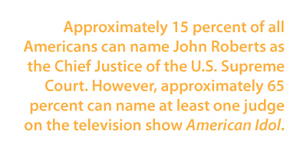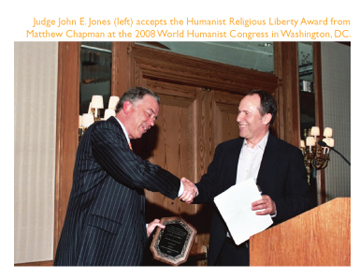Inexorably toward Trial: Reflections on the Dover Case and the “Least Dangerous Branch”
 Judge John E. Jones III of the U.S. District Court for the Middle District of Pennsylvania is one of the foremost defenders of evolution in public schools, ruling the teaching of intelligent design unconstitutional in public schools in the landmark Kitzmiller v. Dover Area School District case in 2005. On Saturday, June 7, 2008, Judge Jones was awarded the American Humanist Association’s Humanist Religious Liberty Award at the World Humanist Congress in Washington, DC. The following is adapted from his acceptance speech.
Judge John E. Jones III of the U.S. District Court for the Middle District of Pennsylvania is one of the foremost defenders of evolution in public schools, ruling the teaching of intelligent design unconstitutional in public schools in the landmark Kitzmiller v. Dover Area School District case in 2005. On Saturday, June 7, 2008, Judge Jones was awarded the American Humanist Association’s Humanist Religious Liberty Award at the World Humanist Congress in Washington, DC. The following is adapted from his acceptance speech.
Since the Kitzmiller v. Dover case landed on my docket in December of 2004, I have had an astonishing, almost mind-bending odyssey. That I–a Republican, Bush-appointed judge and a Lutheran from Pennsylvania–accepted the Humanist Religious Liberty Award from the American Humanist Association last year is another step, I suppose, on that odyssey. Someone asked me if I thought my accepting the award might be taken the wrong way. I should point out that the Framers, in their marvelous work creating the Constitution, gave federal judges life tenure, and that’s a great thing. But in a more serious vein, I think it’s important for federal judges to get out and talk about what we do. To the extent that the federal judiciary is maligned and misunderstood, a lot of that is on us. So, I welcomed the opportunity to speak to such a distinguished group at the 2008 World Humanist Congress, and I thank them and the AHA for the honor of the award.
The day the Kitzmiller v. Dover lawsuit was filed I was driving home from my chambers listening to a local radio station, and they said that this big bombastic press conference had been held in the rotunda of the State Capitol in Harrisburg, Pennsylvania. It involved a lawsuit that had been filed by the ACLU, Americans United for Separation of Church and State, and a large firm in Philadelphia, Pepper Hamilton, against a school board in York County, Pennsylvania. It was filed in Middle District Federal Court (my court) as an establishment clause challenge to a policy involving intelligent design. And as I blissfully drove home I had two thoughts: one was that although I consider myself reasonably well read, I couldn’t exactly remember having heard about intelligent design. And the second thought I had was, I wonder who’s going to get that case? I went home and said to my wife, somebody’s going to get that case and it’s going to be really big.
Of course it landed on my docket. And up until the time I did the scheduling conference the following month (January 2005) I believed that through some suasion and through my efforts I could bring the parties to a settlement. But you could tell from their demeanor and their body language that the case wasn’t going to settle, and I thought, well, now we’re heading inexorably towards trial.
It is known by many that in the aftermath of deciding the Kitzmiller v. Dover case, I took some incoming fire by such luminaries as Bill O’Reilly, who called me a fascist. The Rev. Pat Robertson indicated that “this was an arrogant federal judge making an absurd decision” and opined that the community at Dover would likely be vaporized in a natural disaster. Phyllis Schlafly said, “this was an unintelligent rant about intelligent design by a federal judge.” And the coup de grace was administered, I suppose, by Ann Coulter who devoted several pages of her book, Godless, to me. She said, among other things, “that we haven’t had a First Amendment scholar near the bench like this since President Bush nominated Harriet Miers to be on the Supreme Court,” so she didn’t much like Harriet Miers apparently either.
 But it was Phyllis Schlafly, in her criticism of me, who posited that because George W. Bush was elected president with the help of evangelicals and he had appointed me as a federal judge, that in rendering my decision in the Kitzmiller v. Dover case I had “stuck a knife in the backs of those who brought me to the dance.” And of course, the necessary implication there is that federal judges need to get with the program, we need to please political benefactors, we need to take one for the team, where necessary, without any real regard for how we operate. And that was a common stripe in all of the criticisms by the punditry and it really drove me out of chambers and onto the speaking circuit. I knew by the time I decided the case that it had attracted attention, really not just across the United States but across the world, and I thought it was important to speak generally about some of these points.
But it was Phyllis Schlafly, in her criticism of me, who posited that because George W. Bush was elected president with the help of evangelicals and he had appointed me as a federal judge, that in rendering my decision in the Kitzmiller v. Dover case I had “stuck a knife in the backs of those who brought me to the dance.” And of course, the necessary implication there is that federal judges need to get with the program, we need to please political benefactors, we need to take one for the team, where necessary, without any real regard for how we operate. And that was a common stripe in all of the criticisms by the punditry and it really drove me out of chambers and onto the speaking circuit. I knew by the time I decided the case that it had attracted attention, really not just across the United States but across the world, and I thought it was important to speak generally about some of these points.
And my case, as you well know, was not alone in being subjected to this kind of ideology. We need only look to the Terri Schiavo case that was resolved earlier in 2005. Wherever people come down on that very emotional case, lost in the analysis was that by the time Judge Jim Whittemore rendered his decision and refused the injunction that would have placed the feeding tube back into Schiavo, approximately twenty state judges had looked at the case and every single one of them found that Schiavo had her due process and that the case had been handled properly. But Congress had a boundless enthusiasm to inject itself into that and create a federal law specifically for the purpose of involving the federal judiciary, causing Tom DeLay and others to directly threaten the careers of federal judges after Schiavo eventually passed away.
These cases ultimately give rise to the presumption that most Americans don’t understand how our system of justice works in the United States. Polls reveal that approximately 15 percent of all Americans can name John Roberts as the Chief Justice of the U.S. Supreme Court. However, approximately 65 percent of Americans can name at least one judge on the television show American Idol. Most Americans can’t name all three branches of our government and we are really bereft of a good civics education. My friend, former Justice Sandra Day O’Connor, has said that this stuff is not stamped on our genetic material and we need to learn it and re-learn it. And I don’t think we’re doing a particularly good job when we have teachers who want to proselytize rather than teach what they ought to teach in our schools. And so, I think we need a more robust public education curriculum as it relates to government.
Just as we have lost our compass regarding civics education, we are concomitantly losing our compass and our competitive edge due to a lack of focus on science issues in our schools. The issue of good civics education goes to the survival of our American democracy, because if you don’t understand what your rights are, if you don’t understand the constitution and its Bill of Rights, then you stand ready to lose those rights. But the issue of good science education–and I don’t think this is an overstatement–goes to the longevity and the survival of the people of all nations. It’s that important.
 So, to return to what I think is the fundamental misconception in America about the judiciary, it is that we are a majoritarian branch. We aren’t, and that’s hard to grasp for a lot of people. The Framers, when they worked in Philadelphia during a hot summer some 221 years ago, designed a constitution that had within it articles 1, 2, and 3. Articles 1 and 2 designate the legislative branch and the executive branch, respectively, as majoritarian–they are subject to the will of the people; they stand in popular elections. But article 3 is counter-majoritarian. The judicial branch protects against the tyranny of the majority. We are a bulwark against public opinion. And that was very much done with a purpose, and I think that it really has withstood the test of time. The judiciary is a check against the unconstitutional abuse and extension of power by the other branches of government.
So, to return to what I think is the fundamental misconception in America about the judiciary, it is that we are a majoritarian branch. We aren’t, and that’s hard to grasp for a lot of people. The Framers, when they worked in Philadelphia during a hot summer some 221 years ago, designed a constitution that had within it articles 1, 2, and 3. Articles 1 and 2 designate the legislative branch and the executive branch, respectively, as majoritarian–they are subject to the will of the people; they stand in popular elections. But article 3 is counter-majoritarian. The judicial branch protects against the tyranny of the majority. We are a bulwark against public opinion. And that was very much done with a purpose, and I think that it really has withstood the test of time. The judiciary is a check against the unconstitutional abuse and extension of power by the other branches of government.
My case featured a school board that was out of control. It was dominated by individuals who were in fact Young Earth creationists. They were bullies, frankly, and they had no rest until they passed a policy that, ultimately, devolved to me to find unconstitutional. But it’s well to know that Tammy Kitzmiller, who was the lead plaintiff, and the other parents who filed suit did what citizens cannot do in many other nations around the world. They sought relief in a federal court of law to roll back what they considered to be a clear trampling of their rights under the establishment clause in the First Amendment.
Kitzmiller v. Dover informed me–and I submit that it should inform all of us–that we have many miles to go in the United States regarding our understanding of the First Amendment and, particularly, the establishment clause therein. And we also have an equally long distance to travel in terms of how we can uncouple science and religion. These two things are frequently, all too often, conflated in the United States, and when they are conflated both end up being debased.
Many times during the Kitzmiller trial my thoughts turned to the Framers, and it’s a foolish and a rather nonsensical exercise to think about what they would say about a controversy in 2005 but it’s one that I would engage in at odd moments. It’s ultimately unknowable what they would think of a dispute–even the Scopes Monkey Trial in the 1920s, let alone my case–but I did come across some things that a particular Framer said that I think are pertinent. Alexander Hamilton remarked: “Enthusiasm is certainly a very good thing but religious enthusiasm is, at least, a dangerous instrument.” And Hamilton said this about the third branch: “The judiciary, from the nature of its functions, will always be the least dangerous branch. The judiciary has no influence over either the sword or the purse; no direction either of the strength or of the wealth of the society; and can take no active resolution whatsoever. It may truly be said to have neither Force nor Will, but merely judgment.”
I hope that I have exercised good judgment during my time on the bench. The Humanist Religious Liberty Award tells me that I have in at least one case, and I am deeply humbled and grateful for this award.

